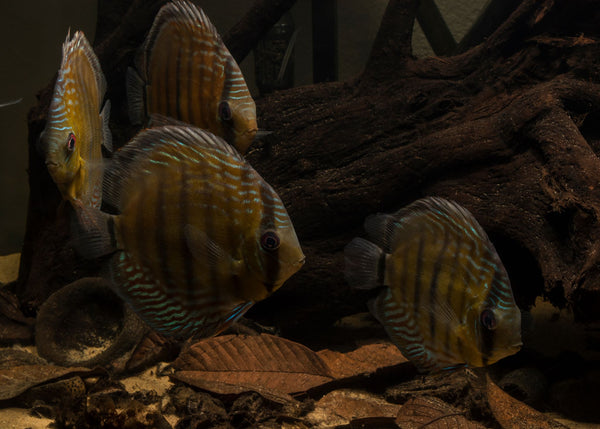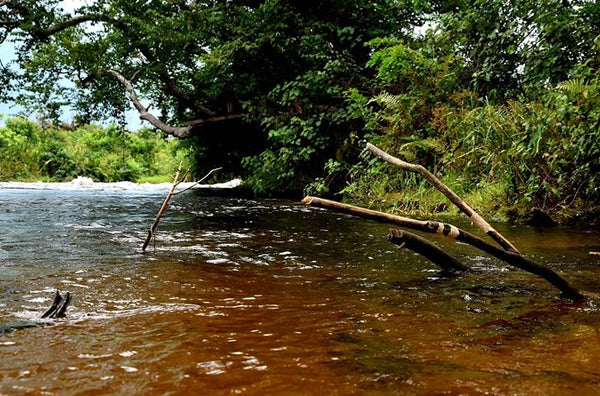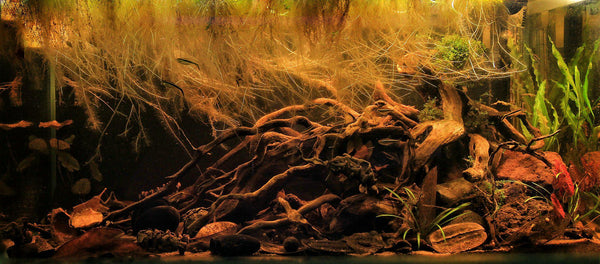- Continue Shopping
- Your Cart is Empty
What's in a name?
Every once in a while, I'll get into these discussions with other hobbyists about the various minute of the hobby...Particularly about areas that I'm fascinated by, of course. Like, oh, I dunno-blackwater/botanical-style aquariums, for example!

A couple of friends and I had one of those chats recently and somebody remarked that the term "blackwater" is being used quite a bit nowadays - thrown around quite casually.

And I suppose it's true...The term "blackwater" in the aquarium context is becoming more and more commonplace, as aquariums featuring these types of conditions are falling more and more into the mainstream of the hobby, and far less of an obscure "sideshow" as they were in years past.
This is always a good thing, I think.
Now, on the other hand, in the aquarium hobby, people love to sort of "take possession" of various ideas, techniques, etc., and make a land grab for "mind share" in a sense. Suffice it to say, the concept of "blackwater aquariums" is subject to just as much analysis, classification, and discussion as any other aquarium movement.

And I've always been a bit leery of "appropriating" for hobby use what have been largely scientific names/descriptors of things...I mean, not always, but some stuff becomes a bit problematic. In the reef world, where I come from, you learn to be less than cavalier about tossing stuff about if you don't have the goods to back up your assertions!
For some reason, in the reef side of the hobby, in addition to pure hobbyists, you have a lot of scientists who happen to be reef hobbyists, and many take great pains to instill accuracy in things we do, while still understanding that it's supposed to be a hobby...They're super cool and helpful. Still others are incredibly offended by non-scientists even using scientific terms or concepts to describe stuff, and will just level you in forum discussions if you assert an opinion that is contradictory to what they know from their work. These discussions can get ugly might fast, too. "You know that Vanadium is only found in seawater in concentrations of 0.0003 ppm, and that can only mean..."
Yeah, that hardcore. It's weird. Shit can get ugly real fast.
However, it instills in you as a hobbyist not to casually toss around scientific terms and ideas if you don't have a really good handle on them. That being said, a term like "blackwater" or "blackwater aquarium" doesn't have a real "official" descriptor, in hobby parlance. I mean, really.

So, when I see us talking about "blackwater", I feel that occasional pang of "reefer's remorse" if I think I go too far. The reality is that the term "blackwater" as defined in science reference literature is a really vague and somewhat broad definition. In fact, you could really argue that it's not really a scientific term at all, merely a "catch all" term to describe a set of characteristics of an aquatic ecosystem.
In fact, about the most cohesive set of characteristic descriptors I can find anywhere indicates that "blackwater" is typically acidic water with low ionic concentrations of sodium, magnesium, potassium, and calcium. It has low conductivity and relatively low concentrations of dissolved solids. That's pretty accurate, IMHO!

Typically, blackwater occurs when vegetation or other terrestrial materials accumulate in rivers and streams, then decompose and leaches tannins into the water, making a transparent, acidic water that is darkly stained, resembling tea. There are other factors, like soil and geological factors, which contribute to blackwater aquatic systems as well, of course.
And that pH-based descriptor isn't all that narrow, either! Aquatic ecosystems that have blackwater in them can vary in pH from as low as 2.9 to 6.5 or higher. It's all over the map, if you examine specific aquatic habitats with blackwater in them! I mean, a peat bog win Asia- most definitely a blackwater ecosystem- might have a pH of around 3.5, whereas a blackwater river, such as the beloved Rio Negro, might have a pH of around 5.1! And a small jungle tributary might have a pH somewhere in between, like 4.7 or so.

I recently saw a discussion in a facebook forum in which a hobbyist described a tank with dark water, no real mineral content, and a pH of about 6.1, and the guy was just getting slammed by some wise-ass who claimed that these were not "blackwater conditions..."
And I was like, "WTF? Here we go..."
Yes, I sat on the sidelines in that discussion, but monitored the sad and inevitable argument that ensued. The guy who was attacking was a real jerk...And offered litter but attitude and loud bluster to back up his position, which was really not too strong. And the reality is that, based on the set of characteristics/factors used to describe blackwater habitats that we ferreted out above, the hobbyist who was being assailed's tank parameters definitely fell well within the generally accepted ones that are applicable to blackwater ecosystems.
The reality is, if we try to apply a specific pH or TDS level to the definition of "blackwater ecosystem", we'd be woefully inaccurate. There's simply too broad a range to do this.
So, the takeaway in all of this?

"Blackwater" seems to a have a broad set of descriptive characteristics that are more of a "range" as opposed to a specific factor or factors, and it is irresponsible to try to narrow this description down too much.
And... from a "hobby culture" standpoint:
We need to have a good understanding of what we talk about. And we need to ditch the pretentiousness. No one owns the damn title of "blackwater aquarium characteristics" or whatever. Sure, some people might understand more about specific topics than other do, but your obligation at that point is to share, encourage, and mentor others- not to be a pretentious loudmouth bully.
Full stop.
Stay curious. Stay educated. Stay inspired. Stay gracious. Stay creative. Stay smart...
And Stay Wet.
Scott Fellman
Tannin Aquatics






Scott Fellman
Author